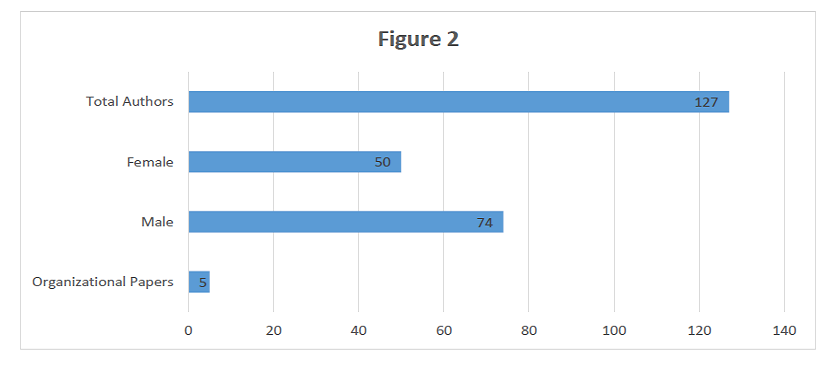Conference Outcomes
The purpose of this conference was to give students, research scholars, teachers, and development practitioners around the world a platform to share their ideas on redefining the education in the context of 21st century. The response was outbound. 127 authors from 15 different countries (See Fig: 1) presented their papers on equity and inclusive education. Among them 74 were male, 50 were female, and we received 5 organizational papers/practitioner paper. (See Fig: 2) Among the 5 organizational papers, 2 had featured authors and 3 were submitted by the representatives of the organizations under the name of their organizations.


Off all the papers submitted and presented for reviewing in the Asian Journal of Inclusive Education (AJIE), there were 10 sub-themes under which the papers were categorized, as mentioned in the figure 3.

In figure 3, presented papers were categorised by the sub-theme and visualised in a bar-chart to get a quick peek of the papers presented. The sub themes are following:
- Global Citizenship for Sustainable Future (GCED, ESD, Learning for Empathy)
- Future Skills for Changing Contexts (Rethinking Soft skills, Transferrable skills, Foundational skills, Disability Inclusive TVET)
- Holistic Diversity Focused Child Development (ECCD, Adolescent Development, ASRH, Mental Health)
- Education in Emergencies (Covid-19, Displaced Children, Climate Change, Conflict Zone, School Reopening)
- Educational Innovation for Ensuring Equity (Models and Practices)
- Gender Equity
- Social Inclusion
- Digital Transformation (Ed Tech., AI, LMS)
- Transformation in Pedagogy Learning Environment and Assessment
- Collaborative Approaches for Development (Multi Level Stakeholder Engagement, OPD engagement)
The 3 popular category of sub-themes under which most papers were submitted and presented for reviewing were the following:
- Sub-theme 9: Transformation in Pedagogy Learning Environment and Assessment (15)
- Sub-theme 8: Digital Transformation (Ed Tech., AI, LMS) (12)
- Sub-theme 5: Educational Innovation for Ensuring Equity (models and practices) (12)
Apart from Bangladesh (35), most papers were submitted from India (22), Nepal (4), and South Africa (3) (See Fig: 1).